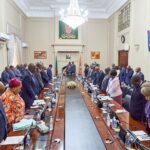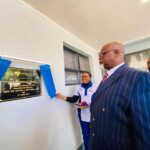The Anti-Corruption Commission (ACC) of Zambia has taken significant steps to repurpose properties that were forfeited due to criminal activities. Among these, the luxurious Altitude Apartments, once owned by PF supporter Francis Muchemwa, and a house in New Kasama previously belonging to Faith Musonda, have been converted into valuable public assets.
The Altitude Apartments, which were seized by the ACC, are now being managed by the Hostels Board of Management under the Ministry of Tourism. The apartments have been transformed into students’ hostels, serving the educational community and providing affordable accommodation for students. This repurposing highlights the Commission’s commitment to ensuring that forfeited properties benefit the public rather than lying idle or going to waste.
Similarly, the house in New Kasama, once belonging to Faith Musonda, has been turned into office space, further demonstrating the ACC’s drive to ensure that recovered assets serve a useful purpose in society. This move is in line with the Commission’s message that crime does not pay, and that assets linked to criminal activity should be returned to the public in a manner that supports national development.
Monica Mwanza, the Acting Director General of the ACC, shared her thoughts on the process, stating that it is important for the Commission to trace and recover assets linked to criminal behavior. “When it is forfeited to the state, we have to ensure that the public benefits from this asset that has been brought back, using the relevant legal provisions,” Mwanza explained. She also emphasized that the Commission is working hard to ensure that these assets are not wasted but are instead used in ways that positively impact society.
Mwanza also underscored the broader message of the ACC’s efforts: “The message we are communicating is that crime does not pay.” She reassured the public that the Commission remains vigilant in managing seized assets and ensuring they are used for the benefit of the nation.
This initiative by the ACC reflects a broader commitment to fighting corruption and promoting transparency, while also ensuring that confiscated properties are put to good use for the public good. The repurposing of these properties not only serves to deter future criminal activity but also enhances the country’s resources, supporting education and business development in meaningful ways.






